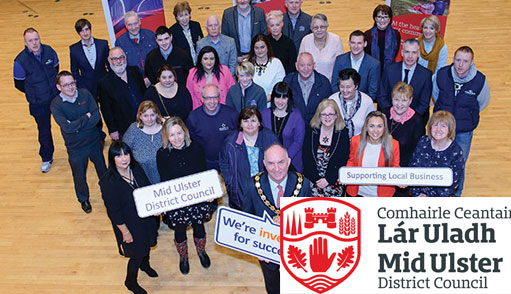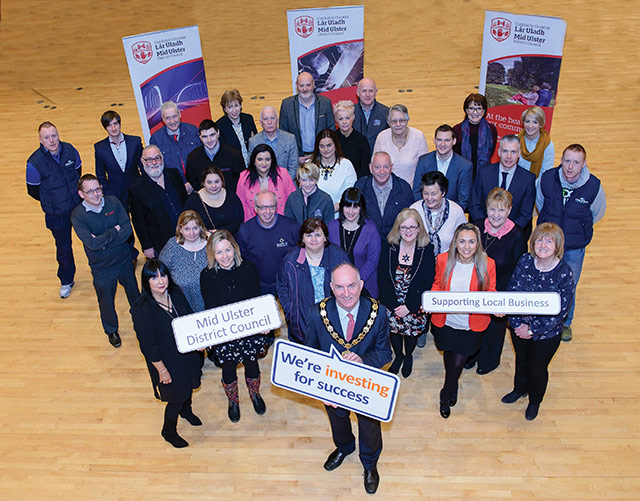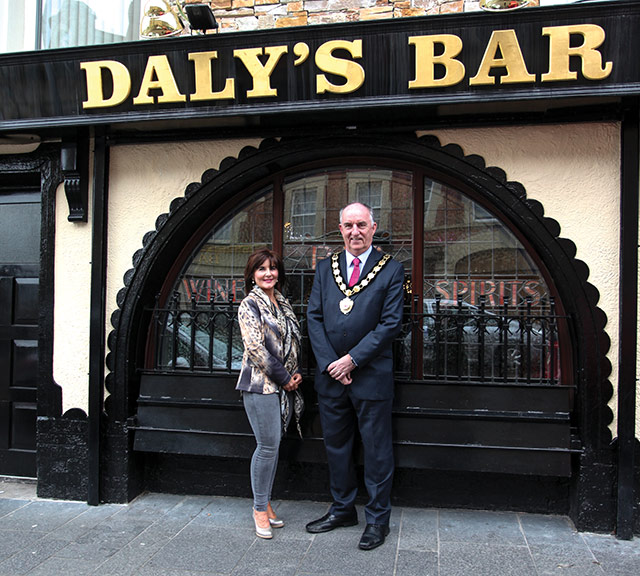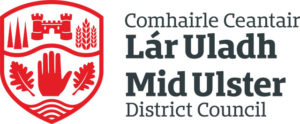Mid Ulster: delivering on our plan for growth


In 2015, following the creation of 11 new Council structures, Mid Ulster was the first council to publish its economic development strategy ‘Our Plan for Growth’, which outlines the Council’s commitment to drive the economic growth of what is Northern Ireland’s most entrepreneurial district over the coming years.
The targets it set are, by design, very ambitious: 3,000 jobs to be created and sustained, 1,500 businesses supported, 1,000 new business starts and stimulating investment of at least £30 million by 2020.
Enabling Economic Growth
Home to 7,915 businesses, Mid Ulster boasts the largest business base outside Belfast and the Council is determined to increase this figure.
‘Our Plan for Growth’ theme 1: ‘Enabling Economic Growth/Sectoral Diversification’ proposes a comprehensive set of actions to accelerate business growth, innovation and productivity, focusing strongly on providing opportunities for Mid Ulster’s SMEs to fulfil their potential.
Four business programmes representing a total investment from Council of £100,000 were delivered in 2016: ‘Mid Ulster Online’, designed to help 20 businesses improve their online presence; a Tender Programme to support 20 businesses to source opportunities for new work and submit high quality tender bids; a Business Development Programme to provide support in up to six key business areas; and a Social Enterprise Programme to assist 14 potential, newly emerging and existing social enterprise organisations.
The 60 businesses and 14 social enterprises who successfully applied for a place to receive bespoke support on these programmes represented the range of Mid Ulster’s key sectors including engineering, manufacturing, construction, services and retail.
At the outset, the Council set ambitious targets for the programmes which were all exceeded; at least 43 new jobs were created and an overall economic impact of over £4 million was achieved representing a 40:1 investment return. This includes significant results from the successful Tender Programme where nine businesses won new work of £2.5 million, with more still pending.
Mid Ulster is the most entrepreneurial region in Northern Ireland in terms of business start-ups; in the past 12 months 230 new Mid Ulster businesses were supported to get started.
Enabling Town and Village Regeneration
This theme tasks the Council with ensuring Mid Ulster’s towns and villages stay ahead of the competition and sustain their growth of recent years. In a predominantly rural area, town centres tend to be the growth drivers of the district with retailers (especially independents) forming an intrinsic part of a vibrant town.
To stimulate regeneration activity in its five principle settlements (Cookstown, Dungannon, Magherafelt, Coalisland and Maghera), the first measure taken by the Council was a large scale physical improvement project, ‘Mid Ulster Town Centre Shop Improvement Scheme’, completed in March 2017.
Property owners/tenants within the scheme boundaries of these five town centres were afforded the opportunity to avail of grant aid up to 50 per cent of eligible costs (max £10,000), to conduct internal refurbishment and/or external improvements to building frontages, to improve town centres’ attractiveness and competitiveness.
By scheme completion, 102 properties were funded, 84 with 50 per cent grant aided by the Council to the value of £387,408, leveraging £561,686 private sector investment. Following successful council applications to the Department for Communities, a further 18 properties were then supported totalling £46,625, with £46,629 private sector investment leveraged. This resulted in a sizeable investment total of over £1 million delivered.
The Council is now embarking on a significant ‘Villages Regeneration Scheme’ which will support physical regeneration works across 37 villages, worth £3 million of which 75 per cent is funded through the Rural Development Programme.
Mid Ulster’s rural businesses also have the opportunity to benefit from funding streams for business expansion activities through the Northern Ireland Rural Development Programme’s Rural Business Investment Scheme (RBIS), one of the funding measures contained within the Local Rural Development Strategy for Mid Ulster being rolled out by the Local Action Group (LAG) for the area, Mid Ulster Rural Development Partnership. Almost £500,000 in grant support has been issued in letters of offer to 23 rural businesses from the first call for applications under the scheme which focused on the manufacturing and engineering sectors. Over 50 new jobs are being targeted from this.
In total the funding accessed by the LAG is £8.3 million, with £2.83 million committed to RBIS with a target of supporting 100 businesses and creating 100 jobs within Mid Ulster’s rural economy.

Enabling Infrastructure and Connectivity
The Council’s extensive engagements with Mid Ulster’s businesses and key stakeholders identified poor broadband and mobile phone coverage as barriers to business growth, key issues for a high performing economy with many businesses seeking to pursue international opportunities. The Council believes that the area must be provided with the appropriate physical infrastructure and connectivity to support its dynamic business community. To address this, the Council has completed a wide ranging ‘Broadband and Mobile Phone Scoping Study’ to identify and map the scale of this issue and will then develop a lobbying paper to make the case for the urgent need for improvements to the Department for the Economy.
Enabling Employability and Skills
The Plan for Growth recognises that one of the key drivers of strong economic growth is the availability of a high performing workforce, equipped with the right skills to meet the current and future needs of the local industry’s key sectors. The new ‘Mid Ulster Skills Forum’ established by Council proposes a collaborative approach to address this, involving local businesses, education providers and sectoral bodies. It will focus on promoting stronger alignment between employment, training and economic development in the local area to ensure that learning and skills directly contribute to employment, growth and economic success for local residents and businesses.
All of the Council’s business initiatives were vastly oversubscribed; this demand is indicative of Mid Ulster’s highly motivated and ambitious business community.
Councillor Trevor Wilson, Chair of Mid Ulster District Council, commended the year’s initiatives: “I am delighted that the Council’s interventions this year have supported an estimated 400 businesses, contributing to the creation of at least 295 new jobs (with potentially 50 more in the pipeline), stimulating an estimated economic impact well in excess of £6 million. ‘Our Plan for Growth’ tasks us with delivering a broad range of interventions to maximise the potential of our local businesses. This first 12 months marks an excellent start to our work.”
For more information on Mid Ulster’s Economic Development Programmes please contact Fiona McKeown, Head of Economic Development, fiona.mckeown@midulstercouncil.org or 03000 132 132






